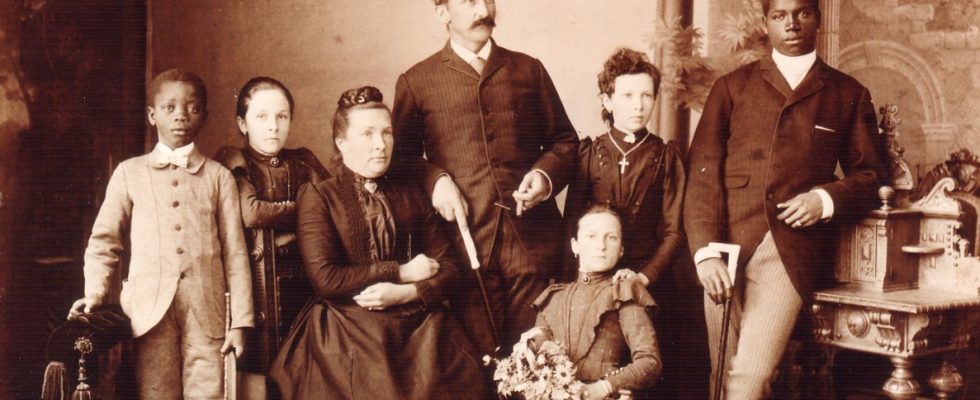There is probably only one story about Germany’s colonial crimes, which began at a special school in Erding near Munich. Jean-Pierre Félix-Eyoum taught there in the 1990s in a colorful knitted sweater, played the guitar, sang and told his students about his great-granduncle, a real king from Cameroon. “Just like here in Bavaria,” he said, and a boy courageously shouted: “Ludwig!” Exactly like that. The Munich filmmaker Peter Heller captured these scenes; he was fascinated by this man, a Cameroon German, who interacted so easily with the white special needs students. That’s what Heller says today.
He made two films about Félix-Eyoum and his colonial reappraisal work. There are 26 years between them, the younger one is premiering this year. They are two documentaries that belong together and complete each other, which is why Heller is showing them in a double pack. They are running in Munich this Sunday evening at the Five Continents Museum. Also present: Félix-Eyoum, now retired as a civil servant. However, in a very restless one, as you can see in the film.
Félix-Eyoum has one goal: He wants to get the German Bundestag to recognize the judicial murder of his ancestor, the king. In 1914, the German colonial administration in Cameroon executed Rudolf Duala Manga Bell, king of the Duala people. The Germans wanted to get rid of him because he did not support the brutal resettlement of blacks in the then capital Duala. What’s more, he exercised his right and lodged a complaint with the Reichstag in Berlin. Cameroon made the resistance fighter Manga Bell a national hero, but hardly anyone in Germany knew him for many decades. This has now improved, and the SZ also wrote about both the king and his great-grandnephew from Erding.
In the film, Peter Heller traces how the case went from a personal mission to a highly political matter. Heller, who describes himself as an “old 68er,” made more than 30 films about Africa; He says that it was he who “infected” Félix-Eyoum with the idea of investigating his great-granduncle in the first place. His documentary “Manga Bell – Damned Germans” from 1997 follows the teacher as he searches for clues in Duala as well as in Aalen and Ulm, where Manga Bell went to school. Because the king not only got to know German culture, he also loved it and was inspired by Enlightenment ideals such as “the equality of all people,” as he wrote. In the colony, however, there was no equality, but rather the hippopotamus whip. And Manga Bell’s idea of sensible Germans soon shattered.
Jean-Pierre Felix-Eyoum researched the story of his great-granduncle.
(Photo: private)
This first film was “much too early,” says Heller. There was no broader public interested in colonial reappraisal. There were only a few people like Félix-Eyoum who dug into the past. Heller continued to accompany the “Bavarian official” with his camera, and many years later, when streets were repurposed and stolen cultural assets were reclaimed from German museums, time and money were found for a second film.
“The Good German” lasts an economical hour in which Heller uses material from three decades. Old recordings as well as modern drone flights over Manga Bell’s crumbling palace in Duala. But the historical injustice only forms the substructure; the focus is on Félix-Eyoum in the maelstrom of postcolonial discourses. He can be seen taking part in the first “Decolonize Munich” debate about looted art in 2014. The Cameroon ship’s beak, a national emblem of the Duala, is still on display in the Five Continents Museum of all places.
Rudolf Duala Manga Bell was king of the Duala people.
(Photo: private)
Félix-Eyoum can be seen traveling across the country and between continents to mediate. Between the Duala, who are demanding reparations, and German politicians, who are already finding it difficult to rehabilitate the killed king. “I’m somewhere pretty much in the middle,” says Félix-Eyoum. But from there he has achieved a lot: in Berlin he is there when Nachtigalplatz is renamed Manga-Bell-Platz in 2022. Squares in Aalen and Ulm also bear the name of the king, inaugurated by the current ruler of Duala.
Heller shows his friend and protagonist as someone who seeks to talk to everyone and everywhere, with the residents of a renamed square as well as with contemporary witnesses and museum visitors. You can hear him talking in a gentle voice about how difficult it was at first to tell Germans about their colonial crimes. “That’s not what they wanted to hear.” But Félix-Eyoum believes in the good in people, he says: “There is not a single child in the world who is born with hatred.”
Heller’s film has no distributor; it is a kind of “hobby product”. He wants to generate some attention with the demonstrations. “We just have to prevail against the Oktoberfest visitors on Sunday,” he says.
Peter Heller’s “Manga Bell” (1997, 45 minutes) and “The Good German” (2023, 52 minutes) will be shown on September 17th, 7 p.m., in the Five Continents Museum, the day before and on the 20th in Aalen, and two Time in Dorfen on September 22nd.

